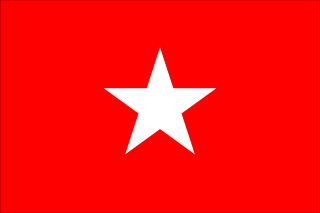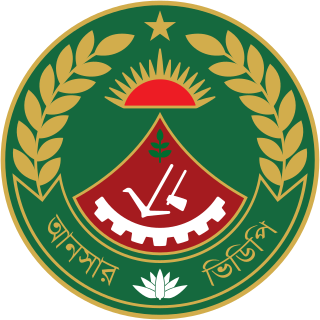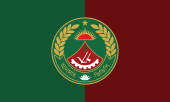
The Home Guard was an unpaid armed citizen militia supporting the 'Home Forces' of the British Army during the Second World War. Operational from 1940 to 1944, the Home Guard comprised more than 1.5 million local volunteers otherwise ineligible for military service, such as those who were too young or too old to join the regular armed services and those in reserved occupations. Excluding those already in the armed services, the civilian police or other civil defence volunteer organisations, approximately one in five men were Home Guard volunteers. Their primary role was to act as a secondary defence force in their home locality in case of invasion by the forces of Nazi Germany.

Mujibnagar, formerly known as Baidyanathtala (Boiddonathtola) and Bhoborpara, is a town in the Mujibnagar Upazila of Meherpur District in Khulna, Bangladesh. The Provisional Government of Bangladesh was formed on 10 April 1971, however, sworn in on 17 April 1971 in this place by the elected representatives of the Bengalees, that led the Bangladesh Liberation War, who were leading the guerrilla war for the independence of Bangladesh from Pakistan in 1971. The place was renamed Mujibnagar by the proclamation of independence, in honour of then imprisoned Sheikh Mujibur Rahman, who had declared Bangladesh independent. The actual capital of the government while in exile was Calcutta. A memorial complex covering 20.10 acres (8.13 ha) has been built at the site where the ministers of that first government took their oaths.

Abdul Jabbar was a protester who was killed during the Bengali language movement in 1952 that took place in the erstwhile East Pakistan. He is considered a martyr in Bangladesh.

The Mazdoor Kisan Party is a communist party in Pakistan. It was founded on 1 May 1968 by Afzal Bangash and Sher Ali Bacha. Other prominent leaders included Ishaq Muhammad and Imtiaz Alam. In the 1970s, the MKP led a militant communist movement in Hashtnagar, Charsadda District, Khyber Pakhtunkhwa.

The Government of the People's Republic of Bangladesh is the central executive government of Bangladesh. The government was constituted by the Constitution of Bangladesh consisting the executive represented by the president, prime minister and cabinet. The legislature represented by the Jatiya Sangsad and the judiciary, represented by the Supreme Court. Bangladesh is a unitary state and the central government has the authority to govern over the entirety of the nation. The seat of the government is located in Dhaka, the capital of Bangladesh.
Law enforcement in Bangladesh is one part of the Justice System in Bangladesh along with Prisons and Courts.

Bangladesh Machine Tools Factory Limited (BMTF) is a commercial enterprise run under the management of Bangladesh Army. It has 19 dynamic factories engaged in manufacturing a total of 566 products. It is located at Gazipur, about 40 km from Dhaka.

The Bangladesh Ansar and Village Defence Force is a paramilitary auxiliary force responsible for the preservation of internal security and law enforcement in Bangladesh. It is administered by the Ministry of Home Affairs of the government of Bangladesh. It has 6 million active and reserved members. It is the largest paramilitary force in the world.

Union council, also known as union parishad, rural council, rural union and simply union, is the smallest rural administrative and local government unit in Bangladesh, with zila parishads being the largest rural authorities and upazila parishads being the intermediate level.
The existing Bangladeshi honours system was created after Independence of Bangladesh. The highest civilian honours are the Independence Award and Ekushey Padak. They are awarded every year. The awards are civilian awards for a broad set of achievements in fields such as Education, Arts, Civil Service, or Social Service and Liberation War. Awards were also bestowed posthumously and they are not given for foreign citizens.

There are 8 divisions and 64 districts in Bangladesh, each district further subdivided into upazila. The area within each subdistrict, except for those in metropolitan areas, is divided into several unions, with each union consisting of multiple villages. Direct elections are held for each union, electing a chairperson and a number of members. In 1997, a parliamentary act was passed to reserve three seats in every union for female candidates. Following elections in the 2014–16 period, 25.2% of councillors were women, up from 23.4% in the 2011–13 period.

The Ministry of Home Affairs is a ministry of the People's Republic of Bangladesh. An interior ministry, it is mainly responsible for the maintenance of internal security and domestic policy. It contains two divisions. 1. Public Security Division, 2. Security Service Division, It has been modelled to function as an ideal and efficient ministry of the government.
Mijanur Rahman Khan is a retired major general in the Bangladesh Army. He was the director general of national paramilitary Bangladesh Ansar and Village Defence Party.
Ansar-VDP Unnayan Bank is a specialized government owned bank in Bangladesh. The bank was founded to provide financial services to the paramilitary Bangladesh Ansar and Village Defence Party. Major General AKM Nazmul Hasan is the chairman of this bank. The bank has 259 branches across the country under 18 regions. It is one of four specialized banks owned by the government of Bangladesh; the rest are Bangladesh Krishi Bank, Karmasangsthan Bank, and Rajshahi Krishi Unnayan Bank.
The Bangladesh Ansar mutiny was a mutiny staged from 1 December to 4 December 1994, in Shafipur and Khilgaon by a section of the Bangladesh Ansar, a paramilitary force tasked with providing security to government installations and aiding law enforcement in Bangladesh. The mutiny prompted a series of reforms by the government.

The Government agencies in Bangladesh are state controlled organizations that act independently to carry out the policies of the Government of Bangladesh. The Government Ministries are relatively small and merely policy-making organizations, allowed to control agencies by policy decisions. Some of the work of the government is carried out through state enterprises or limited companies.
Sheikh Pasha Habib Uddin OSP, SGP, BAMS, afwc, psc is a retired two-star rank Bangladesh Army officer whose last appointment was director general of the Bangladesh Institute of International and Strategic Studies (BIISS). Prior to join BIISS, he was senior directing staff at the National Defense College. Earlier, he was commandant, Bangladesh Ordnance Factories (BOF) and the director general of Bangladesh Ansar and Village Defence Party. He also served as the chairman of Ansar-VDP Unnayan Bank.

Mizanur Rahman Shameem is a Lieutenant General in the Bangladesh Army and incumbent Chief of General Staff at army headquarters. Prior to join CGS, he was the Principal Staff Officer of the Prime Minister's Office, Armed Forces Division. Before that, he served as General Officer Commanding (GOC) of the 9th Infantry Division and Area Commander of the Savar Area. Prior to his current appointment, he served as GOC of the 24th Infantry Division and Area Commander of the Chattogram Area. He also served as Director General of Bangladesh Ansar and the Village Defence Party. He also served as the GOC of the 19th Infantry Division and Area Commander of the Ghatail Area. He served as the Director of National Security Intelligence (NSI) and commanded one Infantry Brigade in Bogura. He received a gallantry award for conducting an operation in the Chittagong Hill Tracts.
AKM Aminul Haque is a major general of the Bangladesh Army and former director general of the Bangladesh Ansar and Village Defence Party. He was the chairman of the Ansar-VDP Unnayan Bank.

A K M Nazmul Hasan is a major general in the Bangladesh Army and Commandant of East Bengal Regimental Centre. Prior to that, he served as the Director General of the Special Security Force. Before that, he was the 24th Director General of the Border Guards Bangladesh (BGB). He also served as the Director General of the Bangladesh Ansar and the Village Defence Party. He was General Officer Commanding (GOC) of the 11th Infantry Division and Area Commander, Bogura Area.












